February 13, 2017
Lillian Boxfish Take a Walk, by Kathleen Rooney
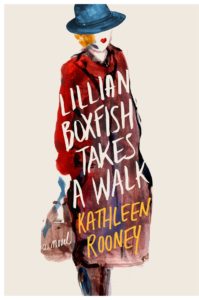 The book everybody’s talking about this season, in my circles at least, is Lillian Boxfish Takes a Walk, by Kathleen Rooney, which I first saw described as Mad Men meets Mrs. Dalloway, or, in other words, as a love letter written directly to my heart. Mad Men because Lillian Boxfish worked in advertising, albeit thirty years before Peggy and Joan, writing copy for R.H. Macy, and she achieved some fame as the highest paid ad woman in America, as well as for her books of Dorothy Parker-esque light verse which sold well in their time. And Mrs. Dalloway because of how the novel is framed in a similar fashion, around a single evening, the last night of 1984 as Lillian Boxfish—old as the century [or actually a year older than that, if you want to get really specific, although she doesn’t]—walks around the New York City she’s seen change around her over the decades. Places on her walk prompting flashbacks to the fascinating story of her career, her marriage, her fame, and various downfalls. In some ways, this is a very easy book, definitely a breezy book, but that to use that point as a dismissal would be to ignore the richness of its language. This is the first book I’ve read in a while which had me pulling the dictionary off the shelf to look up new words, and that makes perfect sense, not just in that Rooney herself is a poet whose attention to language is unsurprising, but so too is her character, Lillian Boxfish (inspired by real-life figure Margaret Fishback). Which reminds me of what Joan Didion wrote about her time working at Vogue where, she writes:
The book everybody’s talking about this season, in my circles at least, is Lillian Boxfish Takes a Walk, by Kathleen Rooney, which I first saw described as Mad Men meets Mrs. Dalloway, or, in other words, as a love letter written directly to my heart. Mad Men because Lillian Boxfish worked in advertising, albeit thirty years before Peggy and Joan, writing copy for R.H. Macy, and she achieved some fame as the highest paid ad woman in America, as well as for her books of Dorothy Parker-esque light verse which sold well in their time. And Mrs. Dalloway because of how the novel is framed in a similar fashion, around a single evening, the last night of 1984 as Lillian Boxfish—old as the century [or actually a year older than that, if you want to get really specific, although she doesn’t]—walks around the New York City she’s seen change around her over the decades. Places on her walk prompting flashbacks to the fascinating story of her career, her marriage, her fame, and various downfalls. In some ways, this is a very easy book, definitely a breezy book, but that to use that point as a dismissal would be to ignore the richness of its language. This is the first book I’ve read in a while which had me pulling the dictionary off the shelf to look up new words, and that makes perfect sense, not just in that Rooney herself is a poet whose attention to language is unsurprising, but so too is her character, Lillian Boxfish (inspired by real-life figure Margaret Fishback). Which reminds me of what Joan Didion wrote about her time working at Vogue where, she writes:
“…I learned a kind of ease with words…a way of regarding words not as mirrors of my own inadequacy but as tools, toys, weapons to be deployed strategically on a page. In a caption of, say, eight lines, each line to run no more or less than twenty-seven characters, not only every word but every letter counted.”
Looking back at her life, Rooney has Lillian Boxfish contemplating the way the public’s relationship to words have changed, the way that the ads she wrote in the 1930s assumed a level of cleverness and awareness of language that contemporary advertising no longer seems to aspire to. Where she finds that same sense of fun and play with language, she remarks, is in the rap music she hears on the streets of New York, a city that’s so much grittier and dangerous than the city she arrived at in her youth. And yet all of it still draws her in, the sounds, the sights, the people all stirring her curiosity. She strikes up conversations and always asks a person’s name, and they get talking, and the moral of every single one of their stories is that people are people, regardless of time or place. Lillian Boxfish sees the humanity, the beauty, in all of it. And so we get to too.
February 9, 2017
Ada Lovelace: Poet of Science, by Diane Stanley and Jessie Hartland
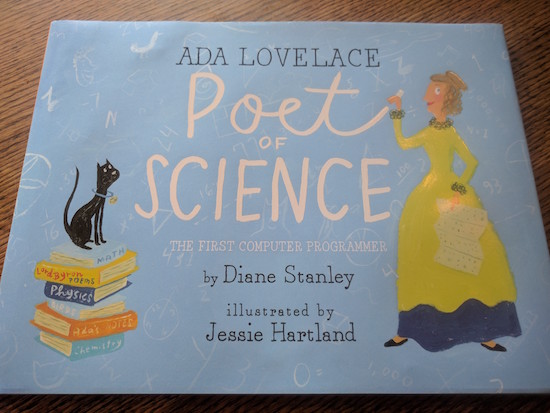
Harriet and I went to see the remarkable Hidden Figures on the weekend, and until the picture book version of the story is released, we will content ourselves with Ada Lovelace, Poet of Science: The First Computer Programmer, by Diane Stanley, illustrated by Jessie Hartland, which was recently selected by the America Library Association among the top ten feminist picture books of last year. (We also know Ada Byron [later Lovelace] as a character from Canadian author Jordan Stratford’s middle-grade series, The Wollstonecraft Detective Agency.)
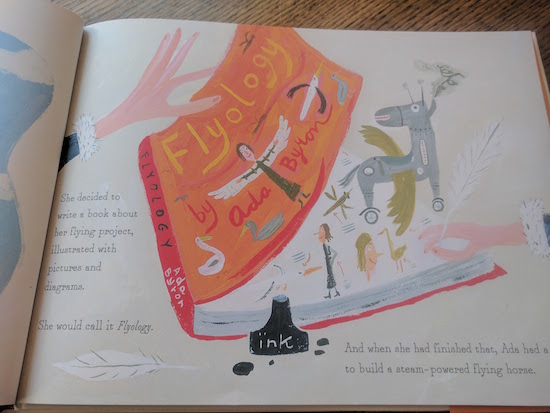
True confession: I don’t understand computer programming. It’s possible that a lifetime of being told that math is hard made me believe that math is hard, or maybe I just find math hard, but my mind doesn’t work that way. I’ve read Ada Lovelace: Poet of Science several times, and while I understand in theory how Ada imagined Charles Babbage’s Analytical Engine worked based on symbols and rules of operation changed into digital form…I actually don’t even understand it in theory. Ada Lovelace’s ideas were inspired by mechanical looms which wove textiles based on patterns dictated by punched cards. I don’t really understand that either.
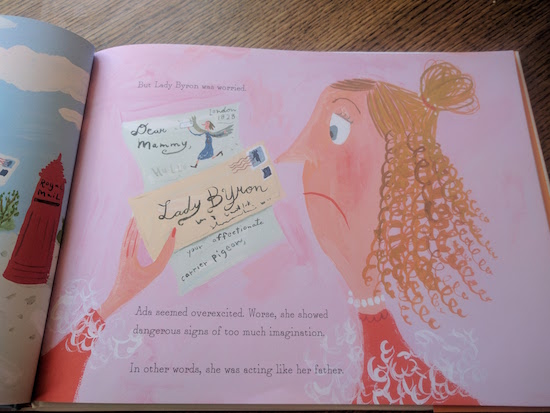
But but but. There is more than one way to be a person, to be a woman, to have a brain. That such things befuddle me is not to say that women are like that and let’s all go back to rocking babies, but instead to say that some women have an aptitude for such things, and it’s useful for even those of us who don’t to realize this. It’s like saying, Maybe I don’t need feminism, but some women do. (Nobody ever says this though. People who don’t need feminism seem to forget the possibility of second clauses.) To be honest, I’m not sure my daughter is going to grow up to be a computer programmer either, genes being what they are, but I will insist on the fact that she knows it’s a possibility. I mean, if a girl could have been one two hundred years ago, before there were even actual computers, then maybe today there are perhaps no limits of what a girl can grow up to be. And isn’t that excellent?
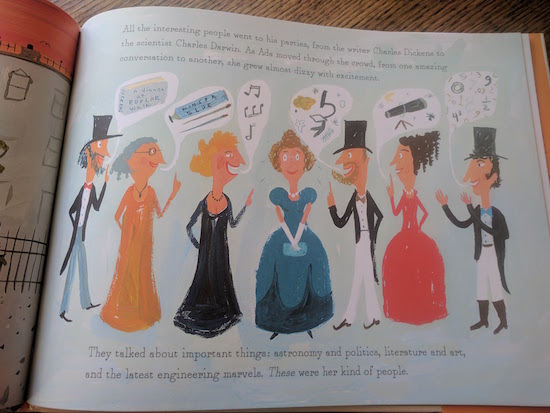
We love this book, about Ada (who gives Rosie Revere, Engineer a run for her money) who has a spectacular imagination, despite her mother’s attempts to school her in logic and rational thinking in order to override her passionate poet father’s genetic legacy. As women of her station had to do, she settled down and married, but that wasn’t the end of her story, and she would go on to do remarkable things in her too short life, indeed becoming the world’s first computer programmer with Babbage’s analytical machine. And what is especially interesting is that there is no direct link between Babbage’s and Lovelace’s work and the development of modern computers, although as Stanley’s author’s note points out, Alan Turing would read their work after they resurfaced after a century of obscurity. But still, I am fascinated by this idea (which is so recurrent in feminism) that some ideas have to be invented over and over again. Or perhaps it’s more miraculous than that—that the great discoveries don’t just happen once, and that progress ain’t a line, but that spectacular bursts of excellence are exploding all the time.
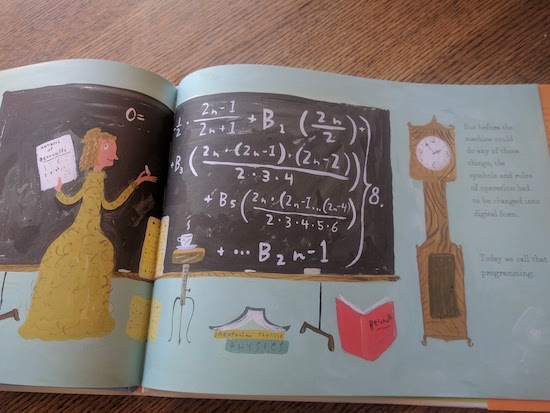
February 7, 2017
The hair has a jacket.
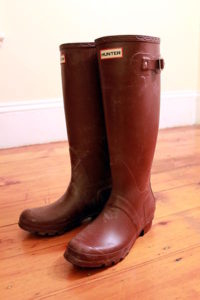 Someone tweeted a photo of Airforce One not long ago, its repulsive occupant on board, and occupant’s jacket was draped around his chair in a most peculiar way, as though the chair was wearing it. “Look! The chair has a jacket!” I tweeted in response, not remotely with wit, except that I actually made a typing error, and my reply in fact read, “Look! The hair has a jacket.” Completely lunacy. And I now have visions these days of running into crowded rooms and screaming this phrase, to everybody’s confusion. Who is that strange person?
Someone tweeted a photo of Airforce One not long ago, its repulsive occupant on board, and occupant’s jacket was draped around his chair in a most peculiar way, as though the chair was wearing it. “Look! The chair has a jacket!” I tweeted in response, not remotely with wit, except that I actually made a typing error, and my reply in fact read, “Look! The hair has a jacket.” Completely lunacy. And I now have visions these days of running into crowded rooms and screaming this phrase, to everybody’s confusion. Who is that strange person?
Somehow between now and my book’s publication, I have to acquire some social skills. I also need to find footwear that isn’t a pair of dirty green rubber boots and a coat that is not in fact a giant duvet with sleeves, if I have any home of creating an impression of the author that isn’t “vagrant.” Vagrant who has forgotten how to smalltalk and keeps pointing out how the hair has a jacket.
February 5, 2017
Birds Art Life, by Kyo Maclear
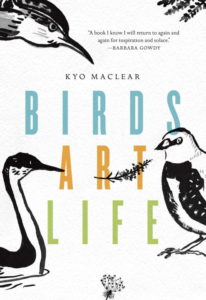 “…what he really taught me was that the best teachers are not up on a guru throne, doling out shiny answers. They are there in the much beside you: stepping forward, falling down, muddling through, deepening and enlivening the questions.” —Kyo Maclear
“…what he really taught me was that the best teachers are not up on a guru throne, doling out shiny answers. They are there in the much beside you: stepping forward, falling down, muddling through, deepening and enlivening the questions.” —Kyo Maclear
In her book, Mommyblogs and the Changing Face of Motherhood, my friend May Friedman refers to the value of “critical uncertainty in practice,” as opposed to “the generalizing trap of expert discourse.” Indeed the best blogs, and life itself, are all about “stepping forward, falling down, muddling through, deepening and enlivening the questions.” And while Kyo Maclear’s new memoir, Birds Art Life, is no blog—its prose is polished perfect; by design, the book is an object most exquisite—it has a bloggish spirit, with its wide vistas, room to wander, and the miraculous and serendipitous way that one thing seems to lead to another.
It’s not a book about birding, or even discovering birding—it’s a book that’s far more vicarious, and stranger than that. Here is a book about a year Maclear spent hanging out with a birder, figuring out what makes him tick. Developing a passion for birds in the process, but that’s not the point of this memoir. Yes, there are birds, but it’s also about family, and history, about caregiving, marriage, waiting, reading. About darkness, and prisons, and action in dangerous times. It’s about cities and nature, about the hearts of things and also their edges.
“Life and death. Survival and extinction. The common and the rare. The robust and the disappearing. I had come to see that birding was about holding opposites in tension. It elicited a twoness of feeling—both reassuring and dispiriting—especially in a city where so little landscape had survived modernity’s onslaught. In that twoness was a mongrel space between hope and despair.” —Kyo Maclear
I’ve loved Kyo Maclean’s work since reading her first novel, The Letter Opener, in 2008. In 2012, she released her second novel Stray Love along with the picture book, Virginia Wolf, and created a list at 49thShelf of Picture Books for Grown-Ups, and what I love about Birds Art Life is that she’s now herself created such a thing. First, because the book is illustrated with photographs of birds by her birding friend, Jack Breakfast, and also with Maclear’s own line-drawings, which add whimsical charm to the pages in a the fashion of Maira Kalman. And second, because of how the stories in this memoir contain echoes of her picture books, works that are so rich in thoughtfulness and wisdom—and now grown-up readers get to read it all too.
But it’s a particular kind of wisdom. I feel as thought Maclear herself would feel uneasy with being declared as wise, but it’s the kind of wisdom she’s talking about in the excerpt I quoted at the beginning of this post. The kind of wisdom that comes from falling down, from enlivening questions, rather than supposing there are even answers.
The year Maclear captures in her memoir is a dark one, although it comes with requisite moments of light. But she’s been caring for her father during a period of illness; she’s still negotiating her relationship with her mother; she worries about her younger son and identifies with his anxiety; close to the end of the year, two close friends of their family are imprisoned in Egypt and news of their fate is held in fear and uncertainty. And as I read this book yesterday, I was thinking that this is precisely the very book I need to be reading right now, not to escape from the things outside my door that make me afraid these but instead to “enliven the questions.” A book that—like so much that I’m reading these days, like so many books that are saving my life—helps me negotiate that space between hope and despair.
Leaning towards the hope, even.
February 3, 2017
My Beautiful Birds, by Suzanne Del Rizzo
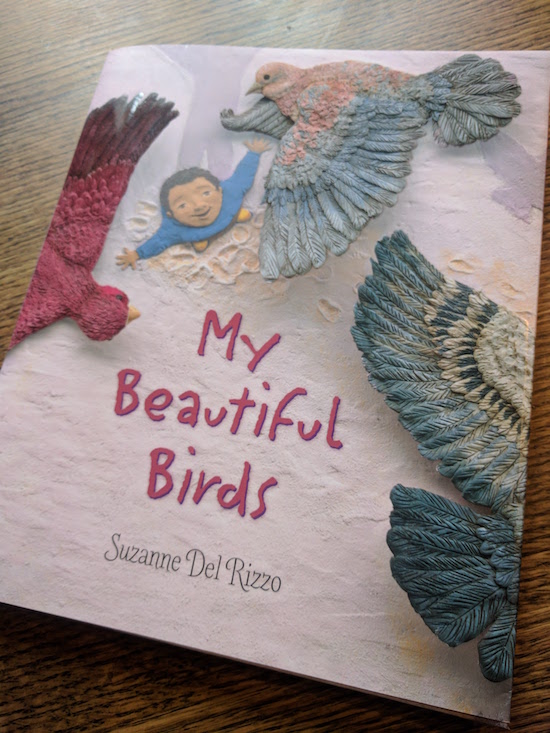
As weird and terrible as the world can be, I don’t spend a lot of time, as the modern problem goes, worrying about “how I’m going to explain it to my children.” As I’ve written before, I relish awkward conversations. But I was thinking about this idea yesterday, about how incongruous it must be to be both a parent and somebody who wants to see refugees restricted from finding sanctuary in their country and community. What do these people teach their children about helping others, I wonder. Do they ever worry about the gap between their messages?
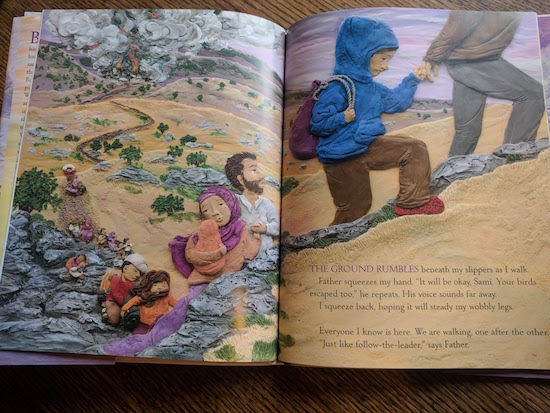
“As a parent,” somebody told me on Twitter this week, “my job is to protect my children from danger.” Hence their support of UnpopularDonald’s Muslim Ban. And the logical next question, although I didn’t ask it because this was Twitter and there was really no point, is “Isn’t that precisely what so many refugee families are doing though? And so surely as a parent then, you can recognize the humanity in these people, that they are guided by the same impulses that direct you, except that their homes have been destroyed by years and years of war and your fear is based on a sense of otherness and is also statistically irrational?”
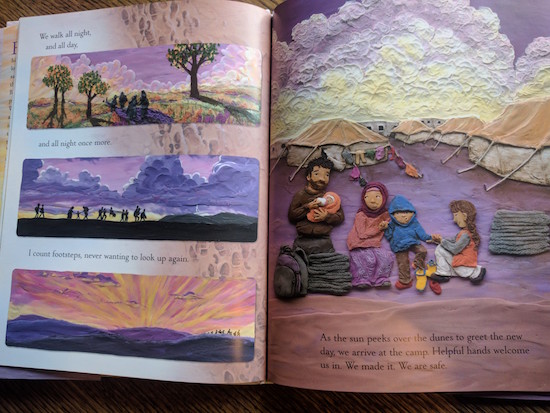
The first time I was happy after November 9 2016 was a few weeks later at the Canadian Children’s Book Awards, and not just because I’d had more than a few glasses of wine. But it was because of the spirit that night, the speeches of the presenters and winners that acknowledged the darkness of the moment we’re currently embroiled in and that books really were one sure way to kick at the darkness, children’s books in particular. Books that bridge the distance between here and there, between us and them, and recognize the humanity common to all of us.
In Suzanne Del Rizzo’s picture book, My Beautiful Birds, a young Syrian boy is forced to leave his wartorn home and make the long journey to the relative safety of a refugee camp. The story is enlivened by Del Rizzo’s plasticine illustrations with their rich purple and golden hues. Of all the things that Sami has left behind. it’s his pigeons he misses the most, the birds he fed and kept and as pets. Although his family does their best to create a home in the camp—planting a garden, buying things in the small shops started by their neighbours—this new life is anything but sure: “Days blur together in a gritty haze. All I have left are questions. What will we do? How long will we be here?” The idea of the birds and their freedom symbolizing everything that’s been lost to Sami.
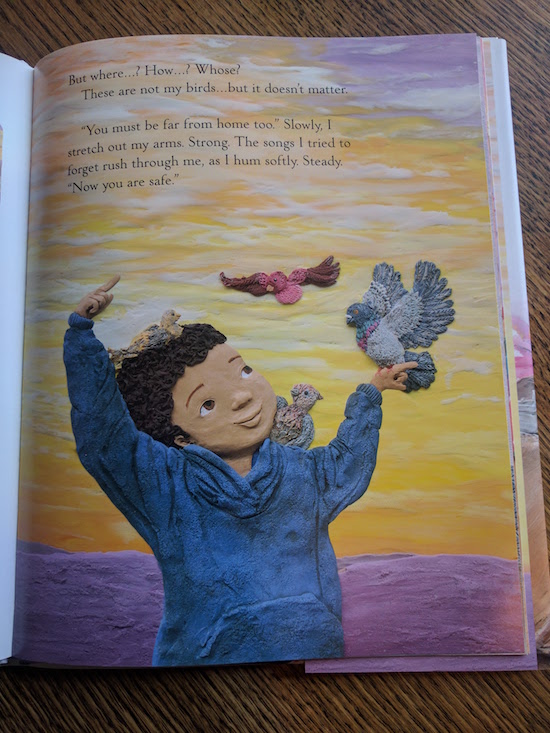
Del Rizzo shows Sami’s grief and sadness with thick black lines that overwhelm the pictures he tries to paint of his beloved birds, the black paint taking over his art like a storm. Where he finds solace, though, is in the sky, one thing that is familiar to him, “wait[ing] like a loyal friend for me to remember.” In the clouds, he sees the shapes of his birds: “Spiralling. Soaring. Sharing the sky.”
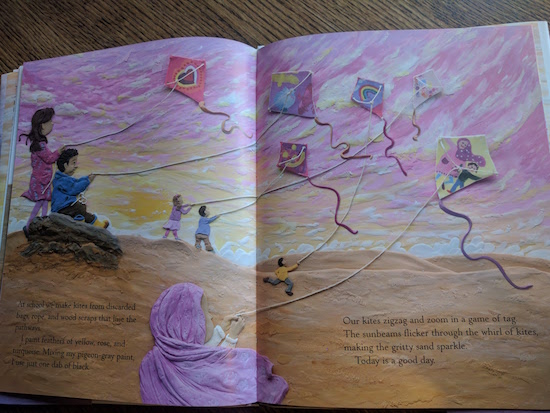
January 31, 2017
Mitzi Bytes Cover Reveal!

It’s been a long time coming, but man oh man it was worth the wait. I am officially in love with the final cover for my novel, Mitzi Bytes, which arrives in the world in just a few short weeks from now, on March 14. Lots of events on the calendar, and I hope to see you out at some of them! If you haven’t pre-ordered the book yet, you can do so at your local bookshop or online at Chapters Indigo or Amazon. You can also make sure it’s on order at your local library, and add it your shelf on Goodreads.
Grateful to everybody for so much support!
January 30, 2017
Together We Stand Tall

I know it’s not a good news day, but I’m feeling positive. Maybe it’s because there was sunshine, or how it felt like something that I wrote letters to my MP and Prime Minister and two other cabinet ministers today imploring them to take a stand against #UnpopularDonald’s Muslim Ban and in general just to do better in order to give Canadians a government we can believe it. It’s because there were marches all over the world today in solidarity with our Muslim brothers and sisters, and my husband emailed me today with a note that said, “Next protest.” And we’re going. It’s because the government’s response to the shooting at a mosque in Quebec City last night was to call it what it was: a terrorist attack. It’s because of this image, and because of the thousands of Americans who’ve been protesting all weekend. It’s because the people are a force, perhaps in a way I never dared to dream of.
I remember listening the radio in September 2015 and hearing the dreadful news of refugees out of Syria. This was when our government was shrugging about the whole thing because what can you do, and then the body of a child washed up on a beach, and someone was recounting the incredible way Canadians stepped up for refugees from Vietnam in the 1970s, and I remember feeling so hopeless. Because things like this just don’t happen anymore…except they do. And they did. And now, 16 months and a new government later, thousands of Syrian families have settled in Canada, their settlement supported by people who are my friends and neighbours. My mom volunteers at her city’s New Canadians Centre, my dad’s partner tutors Syrian women in English. Syrian families were brought to small towns and big cities across this country. These are Canadians I know, and so many I don’t, and they’ve changed lives and the world, and they give me hope that anything is possible.
What oppressive governments do is try to keep their people from seeing other possibilities outside of the present, try to keep them in the dark about the people’s own power—but my feeling is that #UnpopularDonald and his band of merry fuckwits are not doing a terrific job on this front. I think he’s underestimated Americans, and how closely people around the world are actually connected with each other. It’s not going to be soon and it’s not going to be easy, but he’s not going to win, and America’s going to come out into the light.
January 30, 2017
Among the Ruins, by Ausma Zehanat Khan
 What an absolutely crazy, awful and perfect week to be reading Ausma Zehanat Khan’s third novel in her series about Detectives Esa Khattak and Rachel Getty, Among the Ruins, which is published on February 14. Khan’s first book, The Unquiet Dead, won an Arthur Ellis Award, and I read her second novel last summer. In her latest, Khattak is on leave from his job with Canada’s Community Policing Department and has stolen away to Iran on his Pakistani visa, an escape from his troubles at home and a chance to reconnect with his cultural heritage. He has visions of taking in gorgeous sites and and eating delicious food, but any expectations of a holiday are disappeared when he realizes he’s being followed. Turns out a Canadian-Iranian filmmaker, Zahra Sobhani, has been murdered at a notorious prison and Khattak is quietly urged by the Canadian government, on behalf of a shadowy middlewoman, to find out what happened to her. Zahra Sobhani’s work had focussed on Iran’s Green Movement, which contested the results of the 2009 elections after a surge of populism and demands for democratic reform. The regime came down hard on these dissidents, but Zahra Sobhani would have thought her Canadian citizenship might have protected her—so why didn’t it? Khattak considers this question and becomes involved with a group of young people who’d been involved in the Green Movement, this line of narrative providing a powerful perspective on what it’s like to fight for freedom under an oppressive regime. Meanwhile, Khattak’s also receiving mysterious letters from someone who seems to be a political prisoner, and there are aspects of Zahra Sobhani’s death that refuse to make sense. Back home in Toronto, his partner Rachel Getty is perusing her own investigation involving crown jewels and an archivist at the Royal Ontario Museum, stolen jewels and a smuggling operation on the Caspian Sea.
What an absolutely crazy, awful and perfect week to be reading Ausma Zehanat Khan’s third novel in her series about Detectives Esa Khattak and Rachel Getty, Among the Ruins, which is published on February 14. Khan’s first book, The Unquiet Dead, won an Arthur Ellis Award, and I read her second novel last summer. In her latest, Khattak is on leave from his job with Canada’s Community Policing Department and has stolen away to Iran on his Pakistani visa, an escape from his troubles at home and a chance to reconnect with his cultural heritage. He has visions of taking in gorgeous sites and and eating delicious food, but any expectations of a holiday are disappeared when he realizes he’s being followed. Turns out a Canadian-Iranian filmmaker, Zahra Sobhani, has been murdered at a notorious prison and Khattak is quietly urged by the Canadian government, on behalf of a shadowy middlewoman, to find out what happened to her. Zahra Sobhani’s work had focussed on Iran’s Green Movement, which contested the results of the 2009 elections after a surge of populism and demands for democratic reform. The regime came down hard on these dissidents, but Zahra Sobhani would have thought her Canadian citizenship might have protected her—so why didn’t it? Khattak considers this question and becomes involved with a group of young people who’d been involved in the Green Movement, this line of narrative providing a powerful perspective on what it’s like to fight for freedom under an oppressive regime. Meanwhile, Khattak’s also receiving mysterious letters from someone who seems to be a political prisoner, and there are aspects of Zahra Sobhani’s death that refuse to make sense. Back home in Toronto, his partner Rachel Getty is perusing her own investigation involving crown jewels and an archivist at the Royal Ontario Museum, stolen jewels and a smuggling operation on the Caspian Sea.
It’s a mystery whose plot(s) take the shape of something created by a spirograph, which makes it all a little bit difficult to follow at times. This along with devastating sections of the narrative from a character being tortured and raped in prison mean that this isn’t a mystery you’d ever call “cosy,” but then I don’t know that a work of detective fiction has ever been more urgent and relevant than this one. Khan is a gorgeous writer, her sentences shining, and she so vividly evokes an Iran of striking contradictions, of beauty and ugliness, of progress and backwardness, of people who are repressed but who also own themselves in the most courageous, remarkable ways. With a PhD in International Human Rights Law, Khan writes from a remarkable foundation and knowledge of the implications of the stories she tells, and this underlines these stories with so much power.
Most powerful of all though: for readers to enter the mind of a Muslim-Canadian character. Not such a leap, really, but it certainly informed my perspective as I heard the news last night of a shooting at a mosque in Quebec City. Thinking of Esa Khattak: “He’d been cautious since he’d chosen the police as a career. Careful and measured consideration was the only way he knew how to answer the assumption of Muslim rage… Whether he enjoyed living his life on these terms when he could have been at ease, expressing the different sides of himself, the things that have enriched him, enriched, he believed, the fabric of his nation, was a separate question.”
January 28, 2017
Dear Pro-Lifer
 Dear Pro-Lifer,
Dear Pro-Lifer,
Once upon a time. I used to think that you and I could talk. I used to think that if you would just be willing to sit down and listen, I could make you understand that in prioritizing the rights of a fetus you must necessarily steamroll over the bodies and lives of actual women. Surely, I thought, the problem here—our miscommunication—was that you hadn’t realized the terrifying implications of this.
But now I see that you do understand, and the problem is that you just don’t care.
For your benefit, I’m going to spend a moment here situating the abortion issue as a “debate.” Because I know this is how you are see it, that here we are on different sides (when the reality, my friend, is that I am just a person with a body who is quite adamant that you don’t get to decide what I do with it. In reality, why would my bodily autonomy be yours to debate? This is like me telling you how often your should trim your toenails).
So here is my “side”: it’s not that I’ve got anything against fetuses, in fact everybody I’ve ever loved used to be one. My own children, when they were fetuses, were the most precious beings in the world to me (as in fact they still are now that they’re born and in the world) and I still remember the force of my weeping when I was eleven weeks pregnant with my second daughter and bleeding, fearing I was about to miscarry.
But here’s the thing: as much as I like fetuses, I am uncomfortable with the idea of forcing a woman to carry one to term against her will. I am uncomfortable with the fact that women with unwanted pregnancies without access to abortions will resort to desperate measures that could kill her. I am uncomfortable that we might consider it our business to ask a woman whether or not she’d been using birth control and why or why not, and what her economic situation is, and whether or not the sex was consensual—as though these details mean anything at all. I am not comfortable with purporting to be the arbiter of what another person chooses does with her body, and I can’t imagine the arrogance of anybody who would be.
 “But it’s not your body.” This is actually a thing that people have replied to me when I’ve spoken up in defence of my bodily autonomy. As though the fact of my material existence was neither here nor there. As though as a person I didn’t matter—which is telling, really. Says a whole lot about how little you value women’s bodies and experiences. You claim to be defending the voiceless, but you won’t even listen to mine. Which is telling you this: I understand that a fetus has its own body, never mind that for most abortions the body in question is basically microscopic. I get it. But it’s a body that lives in my body, that is created by body, fully sustained by my body. If you are still claiming that this isn’t about bodies, then you’ve probably never been pregnant, which is as bodily as life experience gets. And it’s true that I don’t know exactly where the division lies, where one body stops and another begins. But one thing I do know: it is definitely not your body. That you would purport to override my wishes, to prevail on my freedom, that you could claim to speak for my fetus and have your arbitrary choice win out over my arbitrary choice when it comes to my pregnancy—you, a stranger, perhaps not even a woman; doesn’t that trouble you at all?
“But it’s not your body.” This is actually a thing that people have replied to me when I’ve spoken up in defence of my bodily autonomy. As though the fact of my material existence was neither here nor there. As though as a person I didn’t matter—which is telling, really. Says a whole lot about how little you value women’s bodies and experiences. You claim to be defending the voiceless, but you won’t even listen to mine. Which is telling you this: I understand that a fetus has its own body, never mind that for most abortions the body in question is basically microscopic. I get it. But it’s a body that lives in my body, that is created by body, fully sustained by my body. If you are still claiming that this isn’t about bodies, then you’ve probably never been pregnant, which is as bodily as life experience gets. And it’s true that I don’t know exactly where the division lies, where one body stops and another begins. But one thing I do know: it is definitely not your body. That you would purport to override my wishes, to prevail on my freedom, that you could claim to speak for my fetus and have your arbitrary choice win out over my arbitrary choice when it comes to my pregnancy—you, a stranger, perhaps not even a woman; doesn’t that trouble you at all?
All things not being equal, I would still prefer to live in a world in which women were valued over embryos, rather than one in which strangers made my reproductive choices. And for you pro-life women, when I stand up for reproductive freedom, it’s your reproductive freedom too. The freedom to choose life, should you decide to. But still, the freedom to choose.
When I had an abortion in 2002, I was also choosing life. I hope you see this. But it was my life I was choosing, over that of a lentil-sized fetus. And again, if you regard this as an injustice, if you think my hopes, dreams and future mattered less than an insentient being you could balance on the tip of your baby finger—well, then you don’t value women much. I matter more than a fetus. I will even afford that you matter more than a fetus. And while ideally, it would be terrific and simple if all fetuses could be valued and wanted, we’d have to obliterate actual women in order to do that, and I don’t want to live in that world. (PS Please don’t bring up Jesus. For those of us with no affiliation with Jesus, it’s entirely irrelevant.)
Your next response, I know, being that many aborted fetuses are bigger than a lentil, and you are right about this. But what you are somehow too obtuse to realize is that a vast majority of abortions are preformed before 10 weeks, when a fetus is still mostly potential anyway, when miscarriage is still a statistical likelihood—early pregnancy is always perilous. And that almost every abortion performed beyond that point, in particular far beyond that point, those “late-term” abortions you all despair of—you know these are mostly wanted pregnancies, right? Desperately wanted pregnancies that might be putting a mother’s life in danger, or babies that have failed to develop into babies, or pregnancies that have become non-viable. (See: Interview with a woman who recently had an abortion at 32 weeks.)
Forcing a woman to carry a nonviable pregnancy to term is a demonstrable cruelty. I know that some women choose to do so and are glad they did, but the point was that they get to make the choice. Further, your rhetoric equating abortion with murder is unfathomably cruel to women who’ve had to go through this experience And finally, your images of aborted fetuses (magnified to ridiculous scales because, as a guy standing on the street holding a sign once told me, “If we showed them as they really are, they wouldn’t have any impact”) so crassly plastered onto busses and park benches are also devastatingly painful to these women, as well as to anybody who’s suffered pregnancy loss, and lots of other people with all kinds of stories that you’ve probably never thought about.
There are a million other things that you and I could debate about: where life begins, the ablest politics of abortion, whether or not abortion hurts women as you might claim with your faux-compassion. You might even enjoy engaging in these arguments, the theoretical nature of your approach to all this making the process more enjoyable, even empowering, than it is for me, who is arguing for the right to own my body.
I don’t know if you’ve ever argued for ownership of your own body, but I can tell you that it’s depressing, humiliating, awful, and completely absurd.
So I will leave it at this, at the point at which we first embarked:
Do you understand that in prioritizing the rights of a fetus you must necessarily steamroll over the bodies and lives of actual women?
If you have any notion of humanity, this question should give you some pause.
January 27, 2017
Picture Book Wisdom
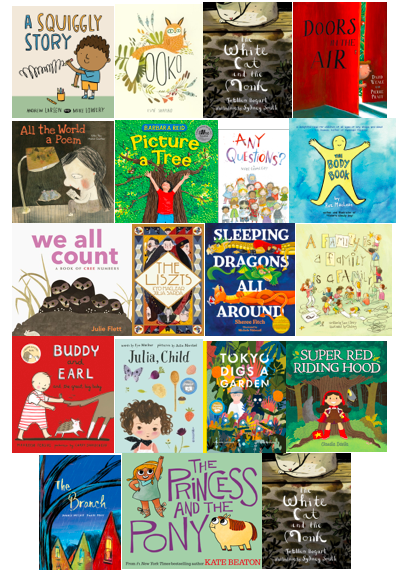
It’s Family Literacy Day today, and I’ve written a post at 49thShelf about how everything I know about the world I’ve learned from picture books. Including, “Dance in the kitchen. Don’t do the dishes” and “Far more than any fame, enjoy the peaceful pursuit of knowledge. Treasure the wealth to be found in your books.”
You can read all the words of wisdom here, and make sure you pick up these great titles if you haven’t already.





